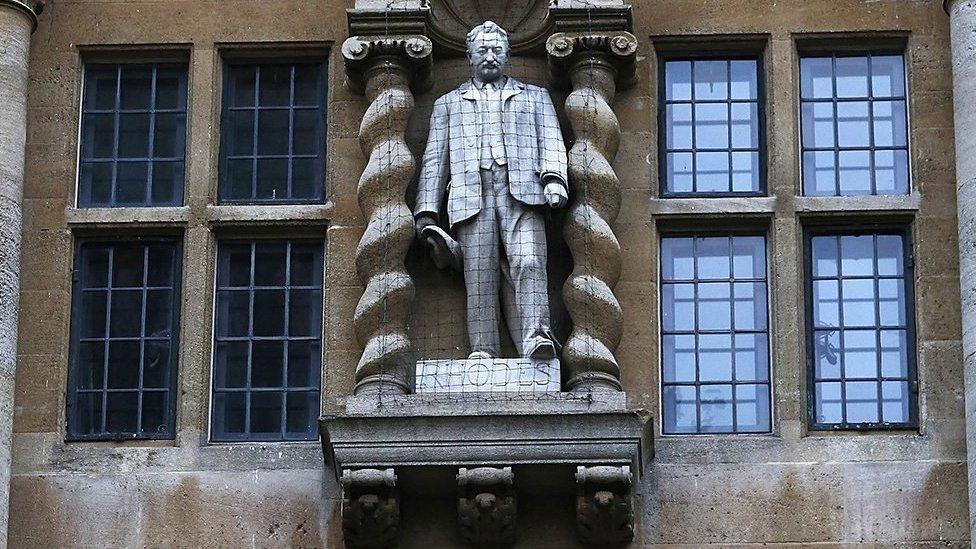Cecil Rhodes statue decision welcomed by Robert Jenrick
- Published

Protesters have been calling for several years for the statue to come down
The communities secretary has welcomed a decision by an Oxford University college not to remove its statue of British imperialist Cecil Rhodes.
MP Robert Jenrick said retaining the statue at Oriel College was "in keeping" with the government's policy "to protect historic monuments."
The college said it would not seek to move its Rhodes statue due to costs and "complex" planning processes.
A decision to remove the statue would need final approval from Mr Jenrick.
Campaign group Rhodes Must Fall said the decision by Oriel College on Thursday not to remove the statue on their High Street building was an "act of institutional racism".
Rhodes had been a student at Oriel and left £100,000 - about £12.5m in today's money - to the college through his will in 1902. His statue sits above a doorway on the front of the college's Rhodes Building.

Mr Jenrick said it was government policy to "retain and explain" controversial statues
Mr Jenrick said he welcomed the decision by the college.
He added: "The government's policy is that we should protect our heritage by retaining and explaining the past rather than censoring our history, and retaining the statue is in keeping with our changes to planning law to protect historic monuments."
Oriel's governing body said in June last year it wished to remove the statue and appointed an independent commission to examine the figure's future and legacy of Rhodes with the college.
Despite the commission not specifically analysing if the statue should be removed or not, the "majority" of its members supported it being taken down.
However, the college's governing body later changed its decision after considering "regulatory and financial challenges".
The commission included broadcaster Zeinab Badawi, the late Conservative shadow culture secretary Peter Ainsworth and Oxford Labour councillor Shaista Aziz.
Ms Aziz told the BBC she was "personally disappointed" by Oriel's decision.
"It has once again failed to listen and move things forward, it needs to urgently do both to build confidence and trust beyond the college and university, with the people of our city."
Ms Aziz said the commission had spoken to and listened to "many people, crucially including school children, young people and the residents of our city".

Protesters gathered in Oxford's High Street outside Oriel College in June 2020
The commission's report noted an application for planning permission to remove the Rhodes memorials would face "considerable challenges" and would "test the significance of considerations of social harm in planning applications concerning 'contested history'".
The commission recommended the college make moves to contextualise its memorials to Rhodes due to the time it would take to go through planning process and the "likely" event that it would be "called in for decision" by Mr Jenrick.
An Oxford City Council spokesman said while Mr Jenrick had "final say", each case would "be considered on its merits and exceptions can be made".

Follow BBC South on Facebook, external, Twitter, external, or Instagram, external. Send your story ideas to south.newsonline@bbc.co.uk, external.
- Published1 April 2015

- Published29 April 2021
